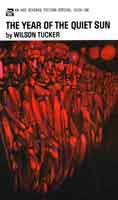
The Year of the Quiet Sun
Wilson Tucker
252 pages
published in 1970
James Nicoll reviewed this some four years ago as part of his millennial reviews, of science fiction set roughly in the year 2000. It was thanks to his review this title stuck in my head and which made me buy this novel some time back. Otherwise, I would've only known Wilson Tucker as the writer who gave hios name to Tuckerisation, the practise of giving minor characters in your story the names of friends or relatives or other people you'd like to honour.
James review made me curious about this book, though it gave me no great desire to read it as it sounded like such a downer, which indeed it is. Like a lot of American science fiction around 1970 it takes then current developments and turns them to eleven. Therefore, in the far of future of 1978 that the novel is nominally set, the war in South-East Asia is still going on, race relations are not going well and Israel is under continual attack by the Arab nations. There has even been a limited and secret (!?) nuclear exchange between the US and "red China".
Brian Chaney is a futurist, demographic researcher with a sideline in biblical translation, the latter of w hich has landed him in a bit of hot water when he translated a scroll of biblical fanfiction that predates Revelations but has suspiciously much with it in common. He is approached by the Bureau of Standards to work on a top secret project, which turns out to be a time travel project. He will be one of three people who will travel thirty years into the future to see what the US looks like in the far flung year of 2000.
A first test trip to november 1980 (ordered by the current weakwilled president, to see if he won the elections) already shows things have gone from bad to worse, with Chicago divided into a black south and a white north by a improvised wall, the south being under siege from the army and the national guard and martial law having been declared after the Joint Chiefs of staff tried to overthrow the president, an attempt that was suspiciously easily foiled...
The real trips by each of the volunteers quickly runs into trouble, with each man finding out more about the civil war the US has landed itself into, aided and abetted by the Chinese. chicago was nuked, black America rose and almost killed off all white Americans and civilisation collapsed. Needless to say, the time travel project was no success.
The story's focus, despite the synopsis I gave above, lies not on these big historical events, but more on the relationships between the three time travellers and their boss, the "leggy and beautiful" Kathryn van Hise, as seen through Chaney's eyes. The writing is economical and Tucker is a master in ratcheting up the tension, taking his time to set things up and once he has done so, hitting you hard with the payoff. Yes, the future here is outdated and slightly hokey, but still leaves you feeling unheimisch, uneasy. I would say that this is a book worth seeking out.
One thing that struck me is the way Black Americans are treated here, similar to several other science fiction novels from this period --I'm thinking here of Brunner's quartet of dystopia novels, especially The Sheep Look Up and Stand on zanzibar, as well as Norman Spinrad's Bug Jack Barron. In all these novels, Blacks en mass are treated like the Other, a treat, alien, crazed and out of control, straight out of "Birth of a Nation", though with a helping of liberal guilt (they may be out of control, but we deserve it) yet you also have viewpoint Black characters who are sympathetic and treated with respect. There may be an interesting dissertion in this, science fiction as the (subconscious) theatre in which certain anxieties of the time are worked out. One wonders though how much contact all these writers had with Black Americans. Were there any major Black science fiction writers other than Delany at the time? (In fact, are there now, apart from Delany, Steven Barnes and Nalo Hopkinson?)
